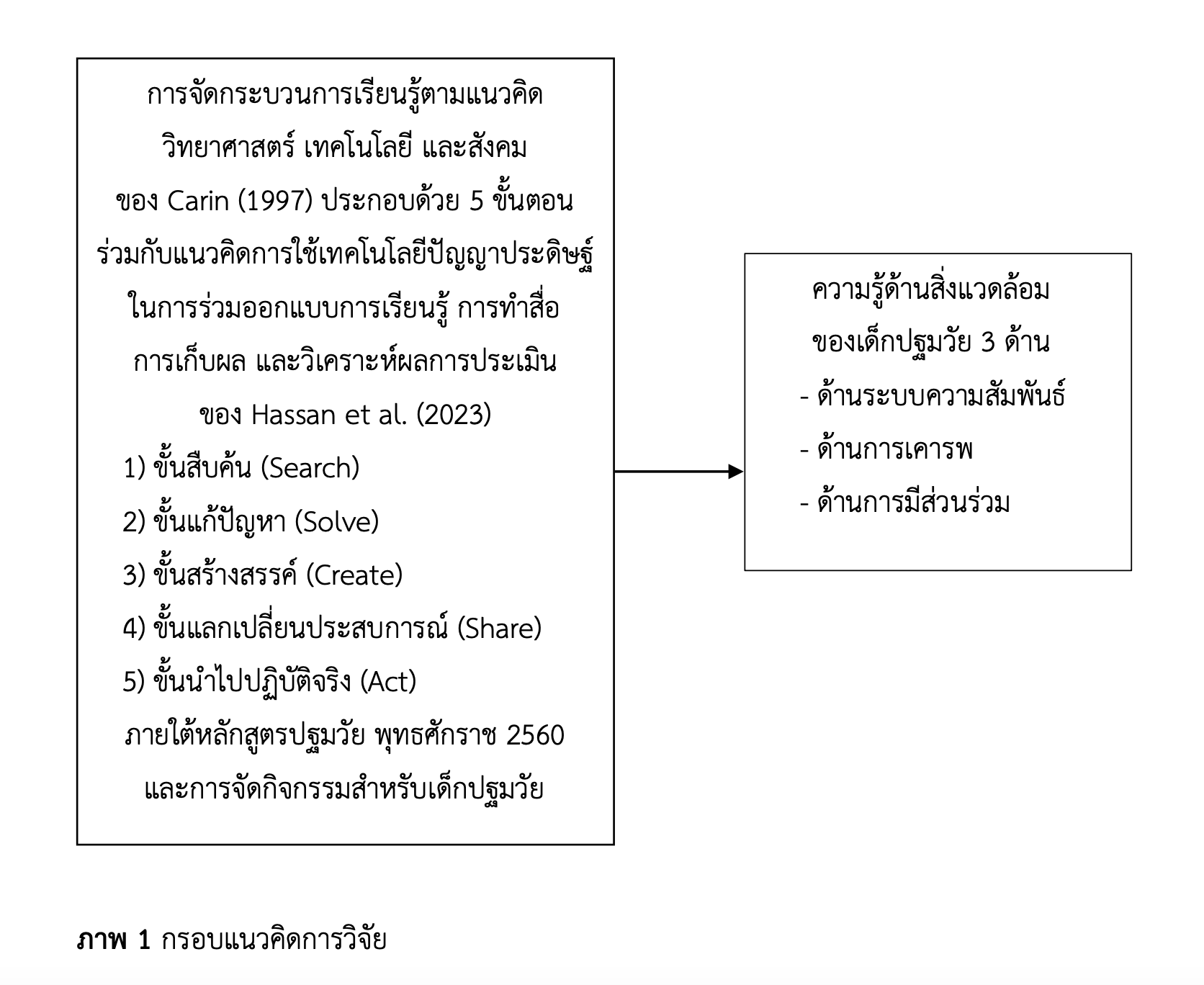Development of a Learning Process Management According to the Science, Technology, and Society Concept Integrated with Artificial Intelligence Technology to Enhance Environmental Knowledge for Kindergarten 2 Students in a School in Chiang Mai Province
Main Article Content
Abstract
The purpose of this classroom innovation project was to examine the results and compare learning process management based on the Science, Technology, and Society (STS) concept integrated with Artificial Intelligence technology, focusing on environmental knowledge for kindergarten 2 (K2) students at a school in Chiang Mai Province. The target group included 23 K2 students during the second semester of the 2024 academic year at a school in Chiang Mai. The research instruments consisted of: 1) units of learning experience plans based on the STS approach combined with artificial intelligence, and 2) an environmental knowledge assessment for K2 students. Data were analyzed using percentages, means, and standard deviations. The findings showed that: 1) before implementing the learning experiences, K2 students’ environmental knowledge across three aspects was below the qualification level, with a mean score of 7.69 (SD = 2.47), or 27.40%, which is below the 70% criterion; and 2) after implementation, students’ environmental knowledge improved across all aspects, with a mean score of 21.64 (SD = 3.32), or 80.14%, surpassing the 70% threshold and classified as very satisfactory.
Downloads
Article Details

This work is licensed under a Creative Commons Attribution-NonCommercial-NoDerivatives 4.0 International License.
แนวคิดและข้อเสนอแนะที่นำเสนอในบทความของวารสารการบริหารและความเป็นผู้นำทางการศึกษา มหาวิทยาลัยรามคำแหง เป็นแนวคิดที่มาจากผู้เขียน หากมีความผิดพลาดใด ๆ ผู้เขียนเป็นผู้รับผิดชอบแต่เพียงผู้เดียว
ทั้งนี้ บรรณาธิการ กองบรรณาธิการ และคณะกรรมการหน่วยจัดทำวารสารฯ จะไม่ก้าวก่ายความมั่นคงในหลักการตามความคิดของผู้เขียน
ดังนั้น บรรณาธิการ กองบรรณาธิการ คณะกรรมการหน่วยจัดทำวารสาร และมหาวิทยาลัย จะไม่รับผิดชอบใด ๆ จากผลที่เกิดขึ้นจากการนำเสนอแนวคิด และข้อเสนอแนะของผู้แต่งที่เผยแพร่ในวารสารฯ
References
Carin, A. (1997). Teaching Modern Science (7th ed). New Jersey: Practice-Hall.
ETS. (2023). AI and Education in 2030: Opportunities and Challenges in Learning. Retrieved May 14, 2025, from https://www.ets.kmutt.ac.th/post/ai-in-education
Ezzaim, A., Dahbi, A., Haidine, A., and Aqqal, A. (2023). AI-Based Adaptive Learning: A Systematic Mapping of the Literature. Journal of Universal Computer Science, 29(10), 1161–1197.
Hassan, K., Shazia, S., and Sihem, A. (2023). Data Management of AI-Powered Education Technologies: Challenges and Opportunities Learning Letters, 1(2), 1–11.
Karen, S. H., Jason, T. N., Rodger, W. B., Thomas, J. M., William, C. M., and Pablo, Z. (2011). Environmental Literacy Framework. Retrieved April 21, 2025, from https://naaee.org/about/ee/environmental-literacy-framework
Prachumphan, J. (2018). PM 2.5 Small Dust in the Air with the Health Crisis that Thai People Have to Face. Retrieved April 21, 2025, from https://thestandard.co/pm-2-5-environmental-nano-pollutants/. [In Thai].
Swanson, J. (2024). Perspectives on Artificial Intelligence in Education: A Conversation between an Education Futurist and An Education Strategist. Retrieved May 25, 2025, from https://ln.run/rXNeX
Taranit, C. (2022). Effects of Environmental Conservation Activities on Executive Functions in Early Childhood. (Master's Thesis, Srinakharinwirot University). [In Thai].
Ministry of Education. (2017). Early Childhood Education Curriculum B.E. 2560. Bangkok: Cooperative League of Thailand Printing House. [In Thai].
Pojantanthi, N. (2015). Science, Technology, and Society Concept. (Department of Education, Faculty of Education, Prince of Songkla University). [In Thai].
Siwalai, S., Piyanun, H., and Oraphan, B. (2022). Effect on Environmental Awareness among Early Childhood Children through the Introduction of an Activity Set under “Knowledge of Environmental Conservation among Preschool Children”. Journal of Educational Innovation and Research, 6(2), 352–365. [In Thai].
Thanonok, P. (2019). The Process of Science, Technology, and Society: Learning to Develop Analytical Thinking in Early Childhood. Journal of Education, Chulalongkorn University. 47(3), 269–289. [In Thai].
Theodorus, C. T., Melor, M. Y., and Hanita, H. I. (2025). Using AI-Powered Tools in Enhancing Reading Skills in the ESL Classroom: A Systematic Review (2020-2024). International Journal of Academic Research in Progressive Education and Development, 14(2), 57–70.
United Nations Educational, Scientific and Cultural Organization. (2020). Education for Sustainable Development: A Roadmap. France: The United Nations Educational, Scientific and Cultural Organization.


